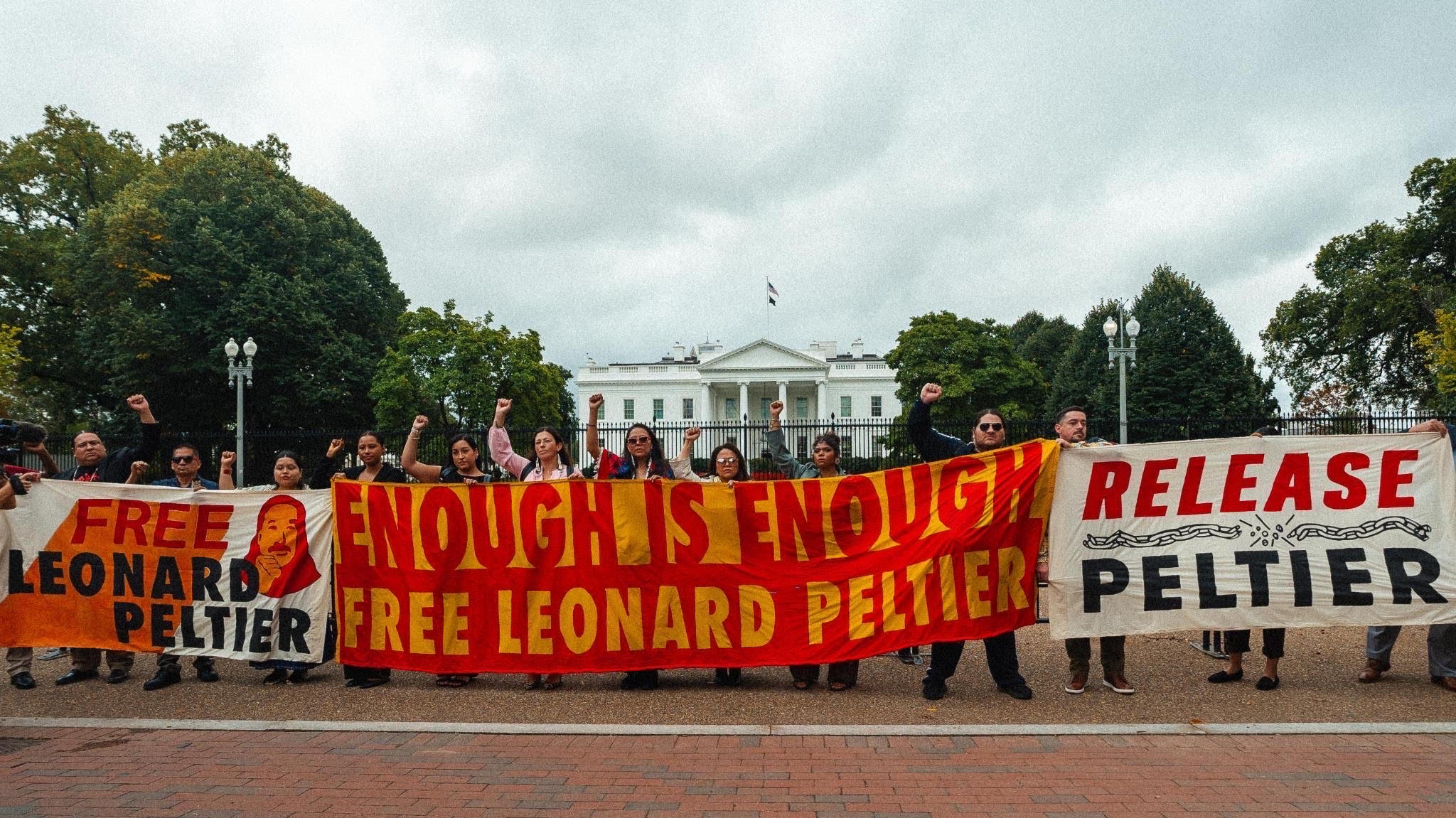
- Details
- By Native News Online Staff
On Wednesday, NDN Collectiverallied in front of the White House and called for executive clemency for Leonard Peltier. At 80 years old, Peltier has been incarcerated for nearly 50 years and is now in very poor health. Time is of the essence to release Leonard Peltier, the longest held Indigenous political prisoner in U.S. history.
NDN Collective is spending the week in Washington to meet with elected officials, calling upon representatives and federal officials to take action on a number of issues including supporting the release of Leonard Pelteir. The following statements were shared on behalf of the organization:
“President Biden now has the opportunity to solidify his already extraordinary legacy in Indian Country as the U.S. president that granted clemency to Leonard Peltier and finally righted a grave injustice,” said Holly Cook Macarro, Government Affairs for NDN Collective. “In the next few months, we are going to organize our many allies in Congress and around the world to unite their voices and support the call for clemency from President Biden.”
“America’s longest living and incarcerated Indigenous political prisoner, Leonard Peltier, is a boarding school survivor,” said Nick Tilsen, NDN Collective President and CEO. “He lived through the atrocities of those schools – and while this country is reckoning with the traumas inflicted on our people by these institutions, it’s important to lift up all our elders who survived boarding schools, Leonard included.”
“The fact that Leonard is still behind bars is the result of a longstanding campaign against him by the FBI,” said Janene Yazzie, Director of Policy and Advocacy for NDN Collective. “Despite the plethora of evidence that shows the system injustices that led to his incarceration, the narrative of the FBI continues to paint Leonard as a murderer. As we move forward, we need to look at all the research and good work done by our partners and other human rights organizations on Leonard’s case to keep ourselves informed.”
On April 19, 2024, Peltier’s request for a compassionate release was denied by the Bureau of Prisons. On July 2, 2024, Peltier was denied parole after a full parole hearing was held on June 10, 2024. Peltier will not be eligible for another hearing for 15 years, when he will be 94. As a result of this denial and Peltier’s age, executive clemency is his best opportunity to be released.
To support Leonard’s freedom, NDN Collective is asking people to:
- Call senators and urge them to support executive clemency for Leonard Peltier
- Watch the latest Red Nation Movement podcast on Leonard's case
- Download the toolkit at freeleonard-peltier.com
- Text FREELEONARD to 50302 for more updates
More Stories Like This
Native News Weekly (August 25, 2024): D.C. BriefsUS Presidents in Their Own Words Concerning American Indians
Federal Judge Orders ICE to Halt Use of Pepper Spray, Arrests of Peaceful Protesters in Twin Cities
Tunica-Biloxi Cultural Leader John D. Barbry Walks On
Next on Native Bidaské: Federal ICE Activity in Minneapolis: Ruth Buffalo’s Perspective
Help us defend tribal sovereignty.
At Native News Online, our mission is rooted in telling the stories that strengthen sovereignty and uplift Indigenous voices — not just at year’s end, but every single day.
Because of your generosity last year, we were able to keep our reporters on the ground in tribal communities, at national gatherings and in the halls of Congress — covering the issues that matter most to Indian Country: sovereignty, culture, education, health and economic opportunity.
That support sustained us through a tough year in 2025. Now, as we look to the year ahead, we need your help right now to ensure warrior journalism remains strong — reporting that defends tribal sovereignty, amplifies Native truth, and holds power accountable.
 The stakes couldn't be higher. Your support keeps Native voices heard, Native stories told and Native sovereignty defended.
The stakes couldn't be higher. Your support keeps Native voices heard, Native stories told and Native sovereignty defended.
Stand with Warrior Journalism today.
Levi Rickert (Potawatomi), Editor & Publisher


